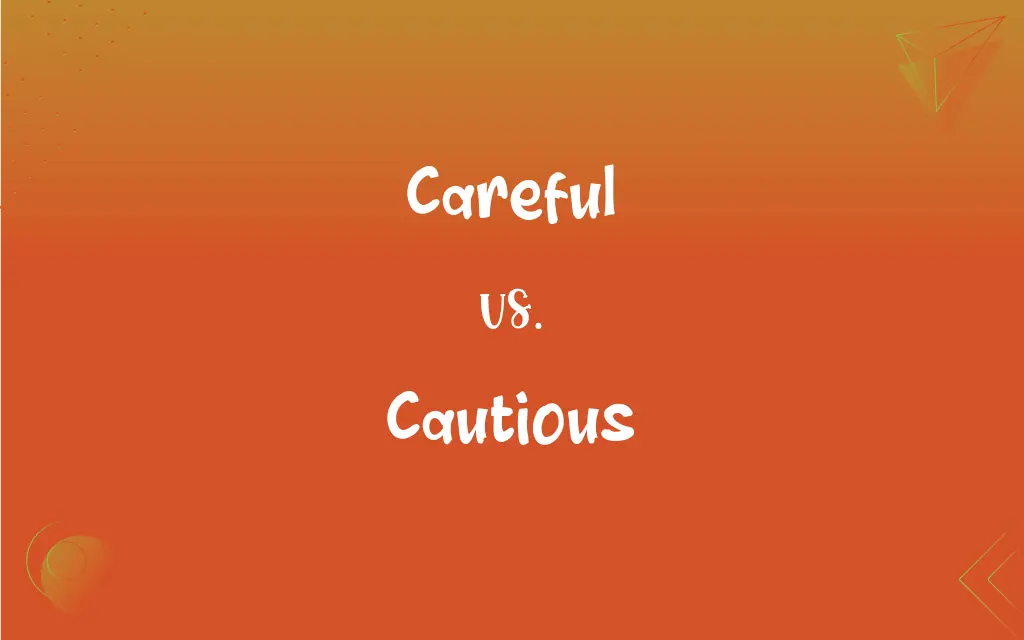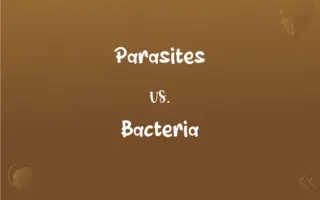Careful vs. Cautious: What's the Difference?
Edited by Aimie Carlson || By Harlon Moss || Updated on October 21, 2023
Careful implies paying close attention to detail to avoid harm or mistakes, while cautious indicates acting with prudence or restraint to minimize risks.

Key Differences
Being careful typically refers to acting with mindfulness and diligence to ensure something is done correctly or to prevent errors. For instance, when one is asked to be careful while painting, it might mean avoiding splatters or ensuring even brush strokes. In contrast, being cautious is about being vigilant and watchful, especially in scenarios that carry certain risks or dangers. For example, someone might be cautious when walking in a new city at night.
The term "careful" often conveys precision and attentiveness. A careful person might double-check their work or move slowly to avoid mistakes. On the other hand, "cautious" implies a wariness of potential hazards or unforeseen challenges. A cautious individual often anticipates potential threats and makes efforts to avoid them.
In some situations, the two words can be used interchangeably. For example, if someone advises you to be careful or cautious while hiking on a slippery trail, both words imply the need for alertness and a focus on safety. However, the nuances differ; being careful might emphasize not tripping or maintaining balance, while being cautious might be a broader warning about potential dangers like wild animals or unstable terrains.
It's crucial to note that while both words highlight the importance of safety and avoiding harm, their usage can be context-dependent. Being careful can suggest a focus on the task at hand and a desire for accuracy, while being cautious often leans more towards a general sense of vigilance and guarding against potential dangers or pitfalls.
Comparison Chart
Definition
Paying close attention to detail.
Acting prudently to avoid risks.
ADVERTISEMENT
Emphasis
Precision and attentiveness.
Wariness of potential dangers.
Application
Often task-oriented.
Typically situation or environment-oriented.
Nuance
Focuses on the act of doing something without mistakes.
Focuses on anticipating and avoiding potential threats.
Example
Checking calculations multiple times.
Investigating an unfamiliar sound in a dark alley.
Careful and Cautious Definitions
Careful
Acting deliberately and thoughtfully.
She was careful in choosing her words during the discussion.
ADVERTISEMENT
Cautious
Being wary or vigilant in unfamiliar situations.
She is always cautious when meeting strangers.
Careful
Taking pains to avoid damage or mistakes.
He was careful when handling the fragile vase.
Cautious
Guarding against potential pitfalls or threats.
Even though he is an experienced driver, he is always cautious in the rain.
Careful
Ensuring safety and prevention of harm.
Be careful when crossing the street.
Cautious
Avoiding potential risks or dangers.
He was cautious about investing in the volatile market.
Careful
Paying close attention to ensure accuracy.
She was careful to proofread her essay before submitting.
Cautious
Tending to think and act conservatively.
Being cautious, he always saves a part of his salary.
Careful
Meticulous in one's approach or execution.
He is always careful in his research, ensuring every detail is accurate.
Cautious
Acting with prudence and careful forethought.
The cautious scientist double-checked all the experimental data.
Careful
Attentive to potential danger, error, or harm; cautious
Was careful when crossing the street.
A careful answer.
Cautious
Showing or practicing caution; careful.
FAQs
Is being cautious more about anticipation?
Yes, cautious typically relates to foreseeing and avoiding potential threats.
Can the two words be used interchangeably?
In some contexts they can, but they carry different nuances.
Is being careful task-specific?
Often, yes. Being careful usually relates to attentiveness in performing tasks.
Is there a significant difference between careful and cautious?
While both imply safety and vigilance, "careful" often stresses precision, while "cautious" emphasizes avoiding risks.
Can someone be both careful and cautious?
Absolutely. One can pay close attention to detail (careful) while also being wary of risks (cautious).
What might a cautious person avoid?
A cautious person might avoid unfamiliar or potentially risky situations.
Is a careful approach slow?
Not necessarily, but careful often implies thoroughness, which might take time.
Can an organization be careful or cautious?
Yes, organizations can adopt careful strategies or take a cautious approach to risks.
Can a person be too careful or too cautious?
Yes, excessive caution or care can sometimes lead to missed opportunities or overthinking.
Is caution always driven by fear?
No, caution can also be driven by wisdom or experience.
What's an antonym for cautious?
Reckless or rash.
Can a decision be both careful and cautious?
Yes, a decision can be made with attention to detail and wariness of potential risks.
In what scenarios is being careful most important?
Scenarios requiring precision, like surgeries or scientific experiments.
Are these words positive or negative in connotation?
Both words generally have positive connotations related to prudence and safety, but context matters.
Are there idioms related to these words?
Yes, like "throwing caution to the wind" implies being less cautious.
Does being cautious mean one lacks bravery?
No, caution can be a form of wisdom, not necessarily a lack of courage.
Are certain professions inherently more careful or cautious?
Yes, professions like accounting may require more carefulness, while professions like firefighting might require more caution.
In what scenarios is being cautious most important?
Situations with potential risks or unknown variables, like investing or exploring new places.
Does being careful mean one lacks confidence?
No, being careful can simply mean one is diligent or detail-oriented.
What's an antonym for careful?
Careless or hasty.
About Author
Written by
Harlon MossHarlon is a seasoned quality moderator and accomplished content writer for Difference Wiki. An alumnus of the prestigious University of California, he earned his degree in Computer Science. Leveraging his academic background, Harlon brings a meticulous and informed perspective to his work, ensuring content accuracy and excellence.
Edited by
Aimie CarlsonAimie Carlson, holding a master's degree in English literature, is a fervent English language enthusiast. She lends her writing talents to Difference Wiki, a prominent website that specializes in comparisons, offering readers insightful analyses that both captivate and inform.































































